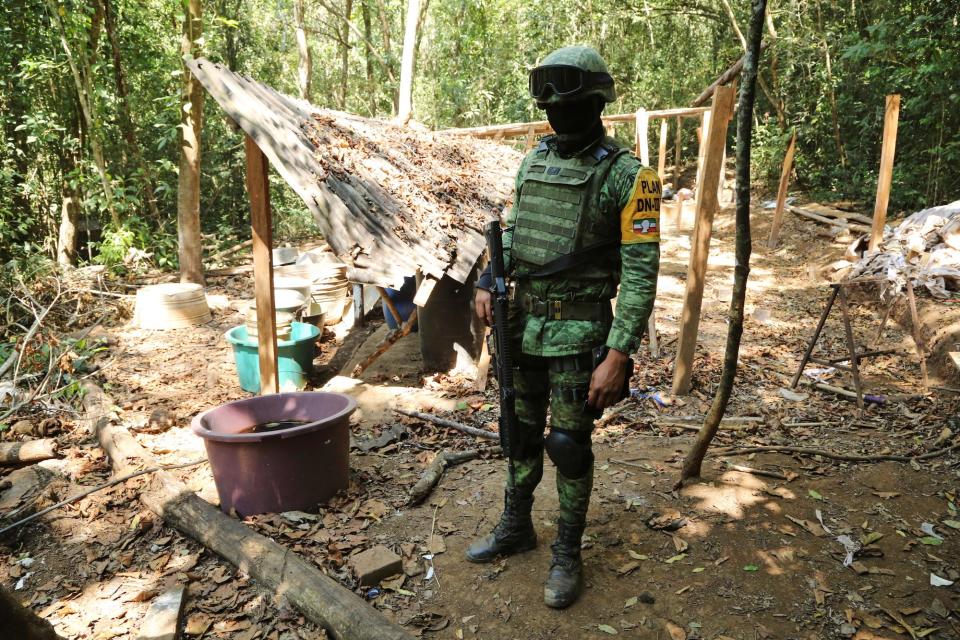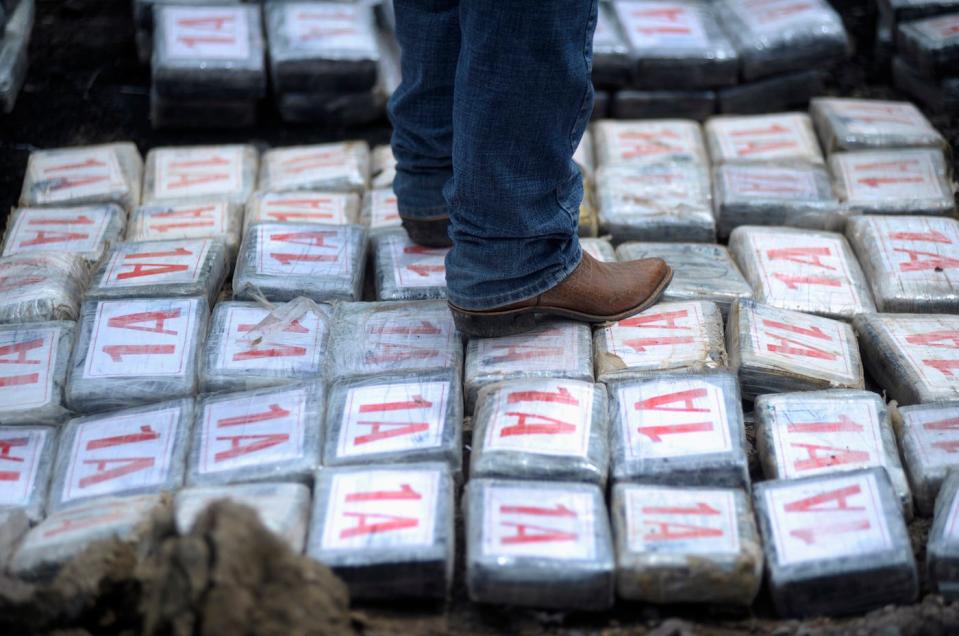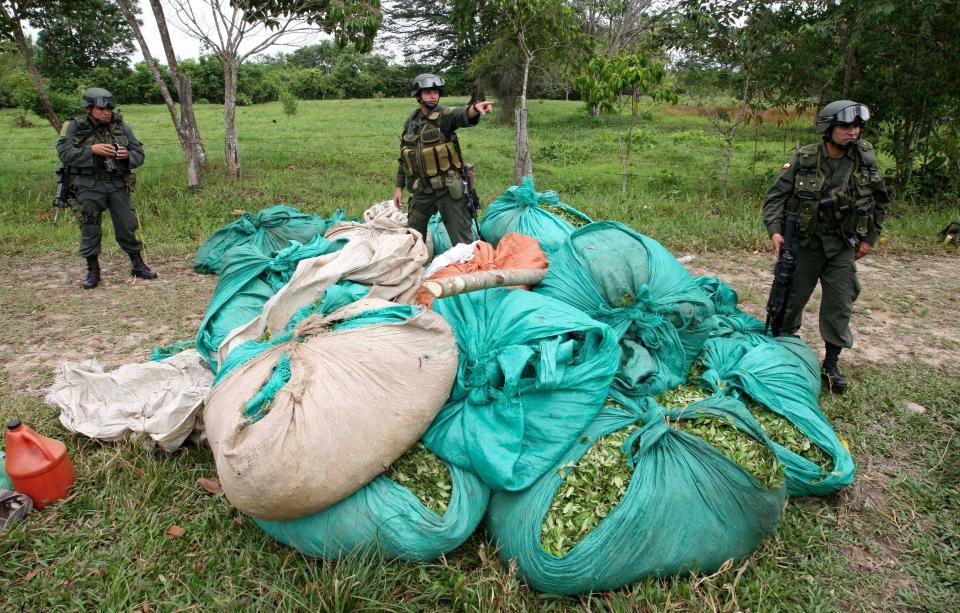Mexico's cartels are experimenting with control of another part of the cocaine trade

Mexico's military destroyed a small coca plantation in February, the third one found since 2014.
It was another sign that Mexican criminal groups are pursuing more control of the cocaine trade.
But a number of factors will prevent those cartels from cultivating the drug on their home turf.
MEXICO - Mexican drug cartels' longstanding attempts to bring coca plantations out of South America and onto their turf may be bearing fruit.
Related: Here's what TV gets wrong about Mexican drug cartels
Mexico's military found and destroyed a 4-hectare plantation of coca in the mountains of Guerrero state in February. This was the third time authorities have found coca plantations in Mexico. The other two were found in the state of Chiapas, near the border with Guatemala, in 2014 and 2020, according to reports.
"We are 900 meters above sea level, and the combination of climate, heat, and altitude has allowed the coca cultivation," Mexican army Lt. Col. Enrique Benítez Campoy said during a press conference after the operation in the mountains of Guerrero.
"We know now someone is experimenting with coca harvesting in Guerrero, and it is very alarming as well as what is happening with the introduction of chemicals [such] as fentanyl," Mexican President Andres Manuel Lopez Obrador said during his morning press conference days later.

Mexican authorities said the plants had been harvested and processed at least four months prior. A lab found afterward contained tools for cocaine manufacturing, suggesting the crops had been processed on-site.
Benítez said that each hectare of the coca leaves would have produced 5 to 7 kilograms of cocaine. He estimated the total value of the final product at about US$12,500, petty cash in the multimillion-dollar cocaine industry.
The first coca field uncovered in Mexico was close to the border with Guatemala in Chiapas in 2014. Authorities found 1,639 plants on about one-third of an acre of land.
Although the amount found most recently is the most yet, it is not significant for a transnational operation and suggests a sort of experiment to test the soil, weather, and quality of the coca plants, according to Mexican officials.

Still, the recent discovery has set off alarms in Mexico, since this could mean a big change in the dynamics of criminal organizations, transforming Mexico from a cocaine-transit territory to a producer.
Colombia is today the world's largest producer of cocaine and has seen a major increase in coca cultivation since 2017, according to the UN. Authorities in Guatemala and in Honduras have also uncovered plots of coca in recent years.
Mexico drug cartels control most of the trafficking and processing operations that get the drug to US consumers.
Colombian officials believe that country's restrictions on precursor chemicals have led Mexican groups to take over more of the refining process, shipping an unfinished form of the drug known as coca base out of the country to be refined into powder in labs elsewhere.
Cartels get creative

While recent discoveries may suggest that Mexican criminal organizations are looking to leave Colombians out of the equation, that might never happen.
Sylvia Longmire, an analyst of the drug war and a former special agent with the US Air Force Office of Special Investigations, said the crops recently found in southern Mexico appeared too small to indicate a looming takeover.
"I have no doubt organized crime is behind these experiments. You need to be a professional to grow coca, but still I wouldn't say this is a threat to the Colombians," Longmire told Insider.
Longmire said the few coca plantations in Mexico could be "a small local operation" by one of the cartels.
"The cartels are always looking to be creative finding ways to make money, and they are losing some [money] on marijuana since the US started producing" it for legal sales, Longmire said. "But if it were easy to grow coca in Mexico they would have done it a long time ago."
Authorities say it's not known which criminal organization could be behind the coca plantations, but according to official data there are six cartels currently operating in Guerrero: Guerreros Unidos, Los Rojos, La Familia, Cartel Independiente de Acapulco, Cartel Jalisco Nueva Generación (CJNG) and Cartel del Pacífico (Sinaloa Cartel).

Rafael Guarin, presidential adviser for security in Colombia, has said only four Mexican cartels are the main players in Colombia's cocaine trade.
"Sinaloa, Jalisco Nueva Generacion, Zetas, and Beltran Leyva are the principal buyers of the supply of coca produced in Colombia," Guarin told Reuters in October 2020.
Longmire wouldn't guess which cartel could be behind the coca experiments in Mexico but said nothing will change any time soon in terms of distribution.
"If the case was that Mexico could grow coca in the future, Colombia is still going to need a distributor, and Mexicans have the control of that all around the world … so I wouldn't say this is going to get anywhere soon," Longmire said.
Conditions in each country mean production levels are also unlikely to change dramatically.
"I don't think it's a matter of time. It's a matter that coca is very hard to grow anywhere else in the world [outside] of Colombia, Peru, and Bolivia. It needs a very specific set of resources," Longmire added.
The DEA didn't respond to a request for comment on the coca found in Mexico. No one was arrested on any of the three illegal coca plantations found in Mexico, and authorities there have not yet shared any updates on the investigations.
Read the original article on Business Insider

